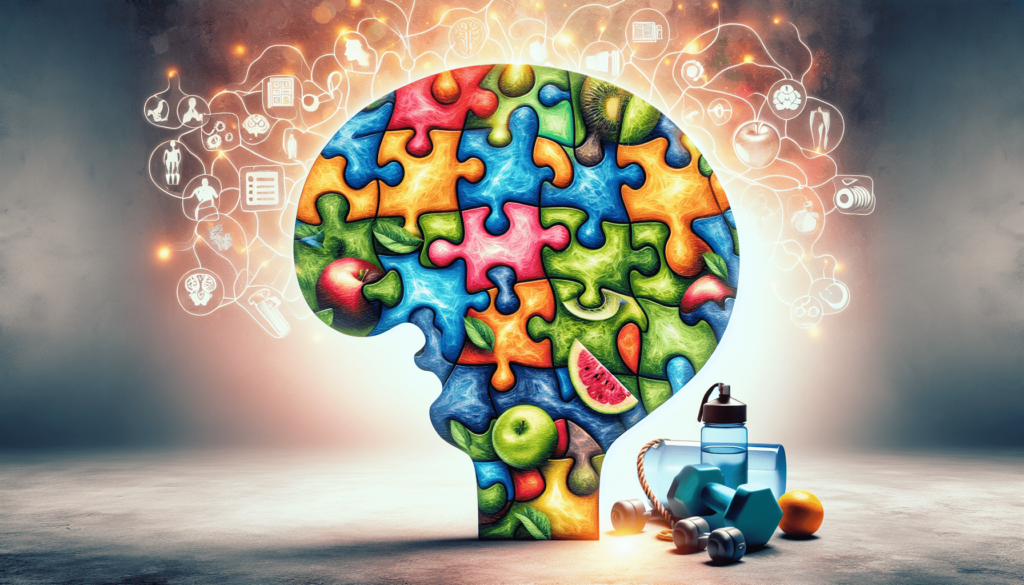Maintaining cognitive health as we age is a concern for many of us. We all want to stay sharp and retain our cherished memories. In this article, we explore lifestyle factors that can contribute to promoting cognitive health. Rather than delving into general background information, we will focus on providing in-depth coverage of specific strategies and habits that may help prevent age-related memory decline. So, if you're curious about ways to keep your mind sharp and enhance your cognitive abilities, keep reading!
Healthy Eating and Nutrition
Importance of a Balanced Diet
Maintaining a balanced diet is crucial for overall health, including cognitive function. A balanced diet provides the necessary nutrients and fuel for the brain to function optimally. It includes a variety of foods from different food groups, ensuring a good intake of carbohydrates, proteins, healthy fats, vitamins, and minerals. By consuming a wide range of nutritious foods, you are providing your brain with the essential building blocks it needs to support cognitive health.
Brain-Boosting Foods
Certain foods have been shown to have a positive impact on brain health and cognitive function. Incorporating these brain-boosting foods into your diet can help enhance memory, focus, and overall mental sharpness. Some examples of brain-boosting foods include fatty fish like salmon, which is rich in omega-3 fatty acids that support brain function. Blueberries, rich in antioxidants, are another great choice as they have been linked to improved memory. Other foods like nuts, avocados, and dark chocolate also provide nutrients that can benefit brain health.
Connection between Nutrition and Cognitive Function
Research has established a strong connection between nutrition and cognitive function. What you eat directly affects the structure and function of your brain. A poor diet, high in processed foods, unhealthy fats, and added sugars, has been associated with cognitive decline and an increased risk of developing conditions such as Alzheimer's disease and dementia. On the other hand, a diet rich in fruits, vegetables, whole grains, lean proteins, and healthy fats supports brain health and can help maintain cognitive function as you age.
Dietary Recommendations
It is important to follow certain dietary recommendations to promote cognitive health. The Mediterranean diet, for example, has been widely recommended for its numerous benefits, including brain health. This diet emphasizes the consumption of fruits, vegetables, whole grains, lean proteins, and healthy fats like olive oil. It also minimizes the intake of processed foods and saturated fats. Following a Mediterranean-style diet has been associated with a reduced risk of cognitive decline. Additionally, staying hydrated and limiting alcohol consumption are crucial for supporting brain function.
Regular Physical Exercise
Effect of Exercise on Brain Health
Physical exercise is not only beneficial for maintaining a healthy body but also plays a crucial role in promoting brain health. Engaging in regular exercise has been shown to improve cognitive performance, memory, and attention. Exercise increases blood flow and oxygen delivery to the brain, stimulating the production of neurotransmitters and promoting the growth of new brain cells. It also helps reduce the risk of chronic conditions such as obesity, diabetes, and hypertension, which can have negative effects on cognitive function.
Role of Exercise in Cognitive Function
Exercise has a direct impact on cognitive function, including memory, learning, and executive functioning. Studies have shown that aerobic exercise, such as brisk walking or jogging, can improve cognitive abilities, including attention and information processing speed. Strength training exercises, such as lifting weights, have also been linked to enhanced cognitive function, specifically in older adults. Engaging in a combination of aerobic and strength training exercises can have the most beneficial effects on cognitive health.
Recommended Types and Amount of Exercise
To promote cognitive health, it is recommended to engage in a combination of aerobic and strength training exercises. Aim for at least 150 minutes of moderate-intensity aerobic exercise or 75 minutes of vigorous-intensity aerobic exercise per week. This can include activities such as swimming, cycling, dancing, or playing sports. Additionally, incorporating strength training exercises two or more days per week can further support cognitive function. It is essential to find activities that you enjoy and make physical exercise a regular part of your routine.

Stress Management
Impact of Chronic Stress on Cognitive Health
Chronic stress can have a detrimental effect on cognitive health. Prolonged exposure to stress hormones, such as cortisol, can impair memory, attention, and decision-making abilities. Chronic stress has also been linked to an increased risk of developing mental health conditions such as anxiety and depression, which can further impact cognitive function. It is important to effectively manage stress to protect and promote cognitive health.
Effective Stress Management Techniques
Implementing effective stress management techniques can significantly improve cognitive health. Engaging in regular exercise, practicing relaxation techniques such as deep breathing and meditation, and seeking social support are all effective ways to reduce stress levels. Taking time for self-care activities, such as engaging in hobbies or spending time in nature, can also help manage stress. Additionally, ensuring a healthy work-life balance and setting realistic goals and expectations can contribute to stress reduction.
Meditation and Mindfulness in Promoting Cognitive Health
Meditation and mindfulness practices have shown great potential in promoting cognitive health. These practices involve focusing attention and awareness on the present moment, which helps reduce stress and improve concentration. Regular meditation has been associated with improved memory, attention, and cognitive flexibility. Mindfulness-based stress reduction programs have also been found to have long-term benefits for cognitive function. Incorporating meditation and mindfulness into your daily routine can contribute to better cognitive health.
Maintaining Social Networks
The Role of Social Interaction in Cognitive Health
Maintaining social connections plays a crucial role in promoting cognitive health. Social interaction stimulates the brain, keeping it active and engaged. By engaging in meaningful conversations, social activities, and spending time with loved ones, you are providing mental stimulation and promoting cognitive function. Social interaction also offers emotional support, reduces stress levels, and contributes to overall well-being, all of which are important for maintaining cognitive health.
Benefits of a Strong Social Network
Having a strong social network has numerous benefits for cognitive health. Research has shown that individuals with strong social connections are at a lower risk of developing cognitive decline and dementia. Social interaction helps keep the brain active, improving memory and cognitive abilities. A supportive social network can also provide emotional support during challenging times, promoting better mental health and overall cognitive well-being.
Tips for Building and Maintaining Social Connections
Building and maintaining social connections requires effort, but the benefits for cognitive health make it worth it. Some tips for building and maintaining social connections include joining social clubs or groups that align with your interests, participating in community events and activities, volunteering, and reaching out to friends and family regularly. Making an effort to connect with others, both in person and virtually, can go a long way in promoting cognitive health and overall well-being.

Adequate Sleep and Rest
Effect of Sleep on Brain Function
Adequate sleep is crucial for optimal brain function. During sleep, the brain undergoes important processes that consolidate memories, clear toxins, and restore energy levels. Lack of sleep can have a negative impact on cognitive function, including memory, attention, and decision-making abilities. Chronic sleep deprivation has been linked to an increased risk of cognitive decline and neurodegenerative diseases.
Tips for Better Sleep Hygiene
Improving sleep hygiene can significantly contribute to better cognitive health. Establishing a consistent sleep schedule and creating a relaxing bedtime routine can signal to the body that it is time to sleep. Creating a sleep-friendly environment, with a comfortable mattress and pillows, a cool and dark room, and minimal noise, can enhance sleep quality. Avoiding stimulating activities, such as screen time before bed, and limiting caffeine and alcohol consumption can also improve sleep. Ensuring a restful sleep environment and prioritizing getting enough sleep are essential for maintaining cognitive function.
Understanding the Sleep-Cognition Connection
The connection between sleep and cognition is deeply intertwined. Sleep is essential for memory consolidation, as it helps the brain process and store information gathered during wakefulness. It also plays a critical role in emotional regulation, attention, and problem-solving abilities. Disrupted or inadequate sleep can impair these cognitive functions and negatively impact overall brain function. Prioritizing restful sleep is crucial for maintaining cognitive health and supporting optimal brain function.
Regular Mental Stimulation
Benefits of Lifelong Learning on Cognitive Health
Engaging in regular mental stimulation and lifelong learning has been shown to have numerous benefits for cognitive health. Challenging the brain through new experiences, learning new skills, and engaging in intellectually stimulating activities promotes neural connections and helps maintain cognitive function. Lifelong learning has been associated with a reduced risk of cognitive decline, improved memory, and enhanced problem-solving abilities.
Activities for Brain Stimulation
There are various activities that can stimulate the brain and promote cognitive health. Reading, for example, exposes the brain to new information and enhances cognitive abilities such as vocabulary and comprehension. Solving puzzles, such as crosswords or Sudoku, challenges the brain and enhances problem-solving skills. Learning a new language, playing a musical instrument, or engaging in artistic pursuits are all great ways to keep the brain active and promote cognitive health. Incorporating a variety of mentally stimulating activities into your routine can have long-term benefits for brain function.
Role of Reading, Puzzles, and Games in Mental Agility
Reading, solving puzzles, and playing games are all excellent ways to promote mental agility and support cognitive health. Reading regularly exposes the brain to new ideas, vocabulary, and perspectives, expanding cognitive abilities. Solving puzzles, such as crosswords or Sudoku, challenges the brain, improves problem-solving skills, and enhances mental flexibility. Playing games that require strategy, like chess or card games, stimulates the brain and promotes critical thinking. Engaging in these activities regularly can help maintain cognitive function and enhance mental agility.
Avoiding Harmful Habits
Effects of Alcohol and Substance Abuse on Cognitive Health
The harmful effects of alcohol and substance abuse on cognitive health are well-documented. Excessive alcohol consumption can lead to alcohol-related dementia, memory loss, and impaired cognitive function. Substance abuse, including illicit drugs, can have a severe impact on brain function, causing cognitive decline and impairing memory and reasoning abilities. Avoiding these harmful habits is crucial for preserving cognitive health and promoting optimal brain function.
Tobacco Use and Its Impact on Brain Function
Tobacco use has detrimental effects on brain function and cognitive health. Smoking damages blood vessels, reduces blood flow to the brain, and increases the risk of stroke and dementia. Nicotine, the addictive substance in tobacco, has been shown to impair attention, memory, and cognitive function. Quitting smoking and avoiding tobacco use altogether is essential for maintaining cognitive health and reducing the risk of cognitive decline.
Influence of Poor Lifestyle Choices on Cognition
Poor lifestyle choices, such as a sedentary lifestyle, unhealthy diet, excessive stress, and lack of sleep, can all contribute to cognitive decline. A sedentary lifestyle reduces blood flow to the brain and limits cognitive stimulation. Unhealthy diets, high in processed foods and sugars, lack the necessary nutrients to support optimal brain function. Chronic stress can impair memory and attention, while lack of sleep impairs cognitive abilities. Making positive lifestyle choices, such as engaging in regular exercise, eating a balanced diet, managing stress, and prioritizing sleep, is crucial for maintaining cognitive health.
Importance of Regular Health Check-Ups
Keeping Track of Your Cognitive Health
Regular health check-ups play a crucial role in keeping track of your cognitive health. Regular visits to a healthcare professional can help monitor cognitive function, identify any cognitive changes or concerns, and discuss strategies for maintaining brain health. Healthcare professionals can perform cognitive assessments and screenings to detect early signs of cognitive decline or dementia. Keeping track of your cognitive health through regular check-ups allows for early intervention and appropriate management if any cognitive changes are detected.
Tests and Screenings for Cognitive Health
Various tests and screenings are available to assess cognitive health and detect any potential issues. The Mini-Mental State Examination (MMSE) is a commonly used screening tool to evaluate cognitive function, including memory, attention, and language skills. Other tests, such as the Montreal Cognitive Assessment (MoCA) and the Clock Drawing Test, can provide additional insights into cognitive abilities. These assessments, combined with medical history and physical examinations, allow healthcare professionals to obtain a comprehensive understanding of one's cognitive health.
Medical Interventions in Preserving Cognitive Function
Medical interventions can play a significant role in preserving cognitive function. If cognitive decline is detected, healthcare professionals may recommend specific treatments or interventions to manage and slow down the progression of cognitive decline. These interventions may include medications to manage underlying conditions or symptoms, cognitive rehabilitation programs to improve cognitive skills, or therapies to address emotional or behavioral concerns. Regular health check-ups ensure that any necessary medical interventions are implemented in a timely manner to support cognitive health.

Role of Positive Attitude and Mindset
Impact of Positivity on Cognitive Health
Maintaining a positive attitude and mindset can have a powerful impact on cognitive health. Positive emotions promote cognitive flexibility, problem-solving abilities, and memory. Optimistic individuals are more likely to engage in healthy behaviors, such as regular physical exercise and maintaining social connections, which contribute to better cognitive health. Positive emotions also reduce stress levels, protecting the brain from the detrimental effects of chronic stress and supporting overall cognitive well-being.
Role of Optimism and Resilience in Brain Function
Optimism and resilience play a vital role in brain function and cognitive health. Optimistic individuals tend to approach challenges with a positive mindset, which promotes problem-solving skills and enhances cognitive abilities. Resilience, the ability to bounce back from adversity, protects against the negative effects of stress on the brain. Cultivating optimism and resilience through practices such as positive self-talk, gratitude, and reframing negative situations can have significant benefits for cognitive health.
Maintaining Emotional Health for Better Cognitive Function
Emotional health and cognitive function are closely intertwined. Emotional well-being supports cognitive abilities such as attention, memory, and decision-making. Managing and addressing emotional concerns, such as anxiety or depression, is crucial for preserving cognitive health. Engaging in activities that promote emotional well-being, such as practicing mindfulness, seeking therapy or counseling when needed, and maintaining social connections, can contribute to better cognitive function. Prioritizing emotional health supports overall brain function and cognitive well-being.
The Benefits of Hydration
Effects of Dehydration on Cognitive Function
Proper hydration is essential for optimal brain function. Dehydration can have negative effects on cognitive performance, including attention, focus, memory, and overall mental clarity. Even mild dehydration can impair cognitive function and lead to decreased alertness and cognitive performance. It is important to maintain adequate hydration throughout the day to support optimal brain function and cognitive abilities.
Recommended Daily Water Intake
The daily water intake recommended for optimal hydration varies depending on factors such as age, activity level, and climate. As a general guideline, it is recommended to drink at least eight 8-ounce glasses of water per day, which is equivalent to about 2 liters or half a gallon. However, individual hydration needs may vary, and it is important to listen to your body's thirst cues and adjust your water intake accordingly. Staying properly hydrated is crucial for maintaining cognitive function and overall brain health.
The Role of Hydration in Brain Health
Hydration plays a significant role in maintaining brain health. The brain depends on adequate water intake to function optimally. Proper hydration supports blood flow to the brain, ensuring the delivery of nutrients and oxygen. It also helps regulate body temperature and flushes out toxins that can negatively impact brain function. Maintaining proper hydration levels throughout the day promotes optimal brain health and cognitive function.
In conclusion, there are several lifestyle factors that play a crucial role in promoting cognitive health. Starting with a balanced diet that includes brain-boosting foods is essential to provide the necessary nutrients for optimal brain function. Regular physical exercise stimulates brain activity and supports cognitive function. Managing stress through effective techniques like meditation and mindfulness helps protect cognitive health. Maintaining social connections through meaningful interactions contributes to overall cognitive well-being. Prioritizing adequate sleep and rest allows the brain to undergo essential processes for optimal cognitive function. Engaging in regular mental stimulation and lifelong learning enhances cognitive abilities and supports brain health. Avoiding harmful habits such as alcohol and substance abuse, tobacco use, and poor lifestyle choices is crucial for preserving cognitive function. Regular health check-ups help monitor cognitive health and allow for appropriate medical interventions if needed. Cultivating a positive attitude and mindset, along with emotional well-being, supports overall cognitive function. Lastly, staying properly hydrated is vital for optimal brain function and cognitive abilities. By adopting these lifestyle factors, you can promote and preserve cognitive health throughout your life.



